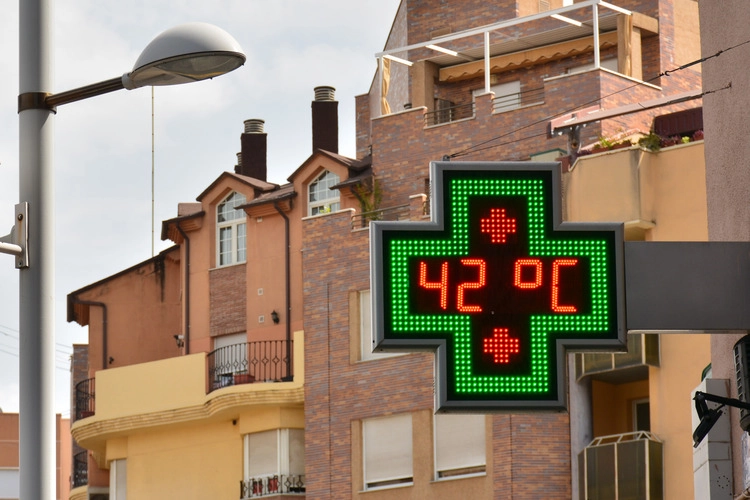


Marco Magrini considers how we have become accustomed to the extremes of climate change
Do you remember when the weather (local, short-term events) was the common subject for small talk? Nowadays, the climate (global, long-term effects) seems to fit casual conversations much better.
Along the first seven months of the year, our warming planet kept drifting away from what was once considered normal. On a global scale, according to the European climate service Copernicus, Monday 22 July was the hottest day in recorded history. It beat the previous record of Sunday 21 July and it will no doubt soon be beaten. July is likely to be the 14th consecutive month with record high global temperature, above the famed 1.5°C baseline.
However, as the prominent climatologist James Hansen recently wrote, the planet is expected to cool off a bit in the coming months (thanks to an upcoming La Niña effect). The bad news is that, according to his calculations, ‘the rate of global warming is really accelerating’, thus challenging our idea of normality even more.
For instance, we’ve always been accustomed to the occurrence of wildfires, yet the flames blazing in the first half of 2024 are confounding our understanding. In the Amazon, an area much bigger than usual has been incinerated. Russia reported a doubling of wildfires compared to last year, even at extreme latitudes. In California, the Park fire – 12 times the size of San Francisco as I write – may burn for weeks and become the largest fire in the state’s history. A look at NASA’s FIRMS website – which tracks wildfires globally in real time – is appalling to say the least. Can we really pretend this doesn’t exist because we don’t see any smoke in the distance?

Climate warming doesn’t make wildfires, it aggravates them. In turn, in destroying forests – our second biggest carbon sink after the oceans – fire warms the climate even more. The result is in front of our eyes or, worse, burning on our skin: heatwaves, once a rarity, are now so common that people seem to take them for granted. In the Northern Hemisphere, the first half of this summer has been eerily scorching on both sides of the Atlantic.
Most importantly, extreme heat is already killing people. At least 1,300 pilgrims died at this year’s Hajj in Saudi Arabia. Scores of poll workers met their death during the recent Indian elections. It’s suspected that nearly 400 people died in Arizona so far, thanks to a sustained temperature of 47°C. A suspicion that has wide implications is that official records tend to undercount reality, as a heart attack caused by a hot spell will just be recorded as a heart attack. ‘
Globally, approximately 489,000 heat-related deaths occurred each year between 2000 and 2019, with Europe accounting, on average, for more than 175,000 deaths every year,’ said Hans Henri P Kluge, European director of the World Health Organization. The common argument – ‘It’s summer, it’s hot, what’s your point?’ – doesn’t hold up very well anymore.
Now, we could talk about recent floods and droughts, about melting Antarctic ice or the super-powered hurricane season to come, but it risks sounding like just the same old song. Instead, listen to this: two studies funded by NASA discovered that days on Earth are growing slightly – very slightly – longer as a result of a redistribution of water and ice on the planet. Melting ice, rising oceans and dwindling groundwater are nudging the Earth’s axis. Isn’t this unbelievable?
Believe it or not, we’ve entered into a new historical age where the very idea of normality gets blurred. ‘Extreme heat is increasingly tearing through economies, widening inequalities and killing people,’ the UN secretary-general António Guterres, a modern-day Cassandra, said. ‘We know what is driving it: fossil-fuel-charged, human-induced climate change. And we know it’s going to get worse; extreme heat is the new abnormal.’
‘The new abnormal’ – it’s a great line. Its original author is probably Michael E. Mann, a professor at the University of Pennsylvania who, a couple of years ago, wrote: ‘We must stop calling this a new normal. It’s a new abnormal and it is now playing out in real time.’ Normality is now a condition of the past. Unless, that is, you insist on basing your understanding of the world only on the old, tiny, field of view that is your local weather report.’
More climatewatch columns from Macro Magrini…
- What happens to the climate crisis if Trump wins in November?
- We ask AI to explain why we struggle with solving the climate crisis
- Doors are closing on solutions, argues the Climate Crisis Advisory Group
- Food for thought: feeding the world accounts for a third of human-made carbon emissions
- Will the COP28 pledge to ‘transition’ away from fossil fuels be enough?



